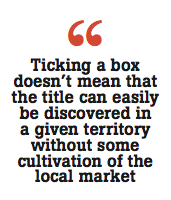You are viewing your 1 free article this month. Login to read more articles.
Authors without borders
While self-publishers have many resources to choose from in their home language markets, selling rights abroad is more difficult. Porter Anderson looks at how indie writers can go global.
If there is a phrase that does not need translation, it’s “lost in translation”. And if there is any element of the independent author’s challenge that looms over all others, it’s handling translation when trying to sell books abroad.
As more indie authors focus on opening international markets, more questions than answers are at hand. It is early days in the deep field of foreign self-publishing. And writers who know that self-publishing is easier than self-selling at home may find marketing even more daunting when it comes to offering their work overseas. Obviously, without dependable, effective, affordable translation, authors remain bound by the invisible frontiers of language.
There are some cases of independent writers being blessed with AmazonCrossing’s extraordinary effort on their behalf. With more than 150 books translated now, this Amazon Publishing traditional imprint has become the US’ most prolific translation publisher, according to Chad Post, director of the University of Rochester’s (New York) Three Percent translation project. German, French and Spanish titles are coming into the US market this way, and titles by independent authors such as J A Konrath, Barry Eisler and H M Ward are being chosen for acquisition and translation to other markets by AmazonCrossing (which is not taking submissions at this time).
 “Last year, we published around 50 original language acquisitions in German,” says Sarah Jane Gunter, head of international at Amazon Publishing and publisher of AmazonCrossing. “This year, we’ll do around 90. And some of those German-language authors we’re now translating into English.”
“Last year, we published around 50 original language acquisitions in German,” says Sarah Jane Gunter, head of international at Amazon Publishing and publisher of AmazonCrossing. “This year, we’ll do around 90. And some of those German-language authors we’re now translating into English.”
One of Crossing’s biggest successes to date is its introduction to the English-language market of Germany’s Oliver Pötzsch and his The Hangman’s Daughter series; the fifth instalment, The Werewolf of Bamberg, is scheduled for a US release on 13th October (see boxout overleaf).
Without an AmazonCrossing deal, many independent authors are looking for ways to expand their range as entrepreneurs. So important is cross-border expansion to the indie sector now that major events and organisations for self-publishing writers are working to define and develop guidelines around the topic.
Tomorrow’s International Self-Publishing and Author Programme at FBF will focus on a range of services and approaches for the internationally-minded writer, with guests including Scott Waxman and Mary Cummings, c.e.o. and vice-president respectively of digital publisher Diversion Books; e-book distributor PublishDrive’s c.e.o. and co-founder Kinga Jentetics; Cameron Drew, vice-president of “soundtrack for books” company BookTrack; Jim Bryant and Scott Beatty, co-founders of publishing networking firm Trajectory; Kobo director of self-publishing and author relations Mark Lefebvre; and Dai Qin, co-founder of reading/publishing app Douban Read.
One key place for information on the subject is the UK-based Alliance for Independent Authors (ALLi), which has started a specific campaign, Going Global. It includes networking among the group’s roughly 25,000 international author-members, associates and followers to support sales in various territories’ local markets.
In her appearance at September’s Novelists Inc (NINC) First Word Day conference programme, which explored indie authors’ international opportunities, ALLi founding director Orna Ross talked about the basic options:
- Use a rights agent to find a foreign publisher;
- Find a translator yourself;
- Consider a translation platform that offers to connect writers and translators, perhaps BabelCube or Fiberead.
At the NINC Conference, University of Virginia lecturer and publishing commentator Jane Friedman recommended Literary Translations. Founded by translator and author Athina Papa, Literary Translations might be termed a heavily curated author-to-translator matchmaking service, in that Papa personally oversees the progress of the writer and the translator, and insists that it must be a collaboration to produce a good result. Papa considers $10,000 (€8,900) to be the right price for genuinely effective translation, charging 12 cents per word for her company’s services. For those looking at the German market, journalist Matthias Matting has recently opened a new site, www.HowToPublishInGerman.com, with courses and news headlines in English.
Of course, even once a translator is found, the work’s effectiveness can be extremely tricky for the independent author to gauge. If a foreign publisher is used, then there is an in-country publishing house in charge of translation and that house has editors who can read the translated version and judge its effectiveness. For the indie, that kind of test is much harder to come by.
The most prevalent advice at the moment, including that of Simon & Schuster imprint Atria Books publisher Judith Curr at the NINC First Word programme, is to look first for markets that don’t require translation. If you are writing in French, there may be African markets available to you, for example, and the audience for English-language material is big—and growing. Trajectory’s Beatty tells us that the number of people studying English in China is now thought to be equivalent to the population of the US (330 million).
Many of the main self-publishing platforms have options to make your work visible in territories outside your own. Kobo is the leader in this regard, with more than 150 territories available for selection by writers using their services. Ticking a box, however, doesn’t mean that the title can easily be discovered in a given territory without some cultivation of the local market. Curr talks of using “brand managers” in each territory, who work on the ground to shepherd and support the introduction of imprints and titles into the local market, something that sounds pretty luxurious to indie ears.
And when it comes to using services such as the fast-rising IPR License, an online rights market—its founder Tom Chalmers joins the Author Programme schedule on Saturday (17th October)—Ross recommends proactive author engagement: “They are as good as the work you put into them.”













